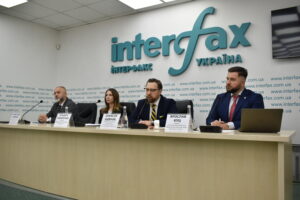
The European Court of Human Rights (ECHR) has recognized that M.S.L. does not have effective legal remedies for its complaints in Ukraine. This decision is the first substantive decision in the ECHR’s practice against Ukraine regarding the application of sanctions in accordance with the Ukrainian law “On Sanctions.”
As Elvira Lazarenko, a partner at the Barristers law firm, told the Interfax-Ukraine news agency, the relevant decision in the case of M.S.L., TOV v. UKRAINE” was published by the ECHR on October 16, 2025 (https://hudoc.echr.coe.int/#{%22itemid%22:[%22001-245275%22]}).
Lazarenko noted that “today, there is a fairly well-established practice of the Grand Chamber of the Supreme Court in ‘sanctions cases’, which states that there is limited possibility for judicial review of decisions by state bodies on the application of sanctions due to the discretionary powers of the National Security and Defense Council of Ukraine and the President of Ukraine to resolve issues of national security.”
“This practice has long been criticized by lawyers, as it demonstrated the de facto refusal of Ukrainian courts to review the factual grounds for the application of sanctions, i.e., a refusal to administer justice properly. The decision in M.S.L., TOV v. UKRAINE is important in that it raises questions about the limits of judicial review by Ukrainian courts of decisions on the application of sanctions and the possibility for courts to assess the significance of the risks that form the basis for the application of sanctions to individuals in accordance with the Ukrainian law “On Sanctions,” she said.
Lazarenko recalled that the case “M.S.L., TOV v. UKRAINE“ concerned the appeal by the company ”M.S.L.” against sanctions imposed on it by a decision of the National Security and Defense Council of Ukraine and enacted in 2015 by a decree of the President of Ukraine, with the subsequent extension of the sanctions by decrees in 2016 and 2017.
The applicant company complained that the imposition of sanctions, in particular the freezing of assets, constituted an interference with its rights guaranteed by Article 1 of Protocol No. 1 to the Convention, as it was prohibited from using and disposing of its assets. The applicant company also raised an issue under Article 13 of the Convention in connection with its lack of an effective remedy for the violation of its property rights.
At the national level, the Ukrainian courts dismissed the applicant company’s claim regarding the first Presidential Decree of Ukraine, and the company withdrew its claims regarding the second and third Decrees.
“In dismissing the company’s claim, the national courts refused to assess the factual grounds for the application of sanctions, referring to the discretionary powers of the authorities that had issued the contested decisions. The Grand Chamber of the Supreme Court indicated that the scope and results of the president’s assessment of the significance of the risks that served as the basis for imposing sanctions on the applicant company are beyond the scope of judicial review, since the administrative court does not have the competence to make decisions on matters of national security and defense,” the lawyer explained.
She noted that, in appealing to the ECHR, the company claimed, in particular, that the national courts had failed to administer justice because they had not examined whether the state authorities had sufficient grounds for imposing sanctions and whether those grounds were supported by any evidence.
“Moreover, the restriction of the scope of judicial review was not based on any provision of national law. In the company’s opinion, the president’s discretionary powers on national security issues should not limit judicial review by national courts or exempt courts from the obligation to verify the grounds for sanctions in accordance with the sanctions law,” Lazarenko said.
The lawyer noted that the ECHR, in turn, pointed out that the decisions of the national courts lacked a substantive judicial assessment of the decision to impose sanctions on the applicant company. In particular, the Supreme Court limited its analysis to the sole question of whether the decision of the NSDC and the first presidential decree complied with the formal requirements of the sanctions law and did not address the substance of the SBU’s allegations against the applicant company.
“Due to the fact that the courts did not verify whether the first presidential decree had a solid factual basis, the ECHR concluded that such judicial review could not be considered a sufficient procedural guarantee against arbitrariness. Accordingly, the ECHR recognized the interference with the applicant company’s right to peaceful enjoyment of property as unlawful,” she said.
In addition, Lazarenko noted that the ECHR, referring to its conclusion about the lack of adequate procedural safeguards against arbitrariness during the judicial review of the decision to apply sanctions, as well as the ineffectiveness of the company’s complaints to the SBU, concluded that the applicant company did not have effective legal remedies for its complaints.
“Given the established status of ECHR practice as a source of law, we expect an appropriate response to the ECHR’s decision in M.S.L., TOV v. UKRAINE,“ from the Administrative Court of Cassation and the Grand Chamber of the Supreme Court, as the courts of first and appellate instance designated to review decisions on the application of sanctions,” the lawyer concluded.

Diplomatic Legal Hub, a permanent consulting and legal center for foreign diplomatic institutions, businesses, and citizens, has been presented in Kyiv. It was created on the initiative of Barristers LLC in cooperation with Ukrainian lawyers. The platform is designed to provide continuous legal support to foreigners in Ukraine and reduce the administrative burden on embassies and companies, particularly in matters related to migration, criminal, economic, tax, and martial law issues.
Oleksiy Shevchuk, partner at Barristers and spokesperson for the Ukrainian National Bar Association (UNBA), emphasized that the hub will function as a practical mechanism for providing immediate assistance.
“Today we are presenting a platform where any representative of an embassy, foreign business, or foreign citizen can report their problem online 24/7 and receive appropriate support. Our team will use, among other things, universal jurisdiction tools to protect against persecution,” he said at a press conference at the Interfax-Ukraine agency on Wednesday.

According to Shevchuk, foreign citizens often remain without adequate state protection in wartime, so the team’s task is to provide them with fast and high-quality legal support.
Elvira Lazarenko, a partner at Barristers, outlined the hub’s service model.
“We provide support throughout the entire cycle — from crossing the border and proper documentation to resolving disputes with the migration service, customs, and in court. For at least the next two years, assistance to foreign citizens will be provided pro bono,” she said.

Yaroslav Kuts, lawyer, deputy head of the UNAA Information Policy Committee, and partner at a2kat, emphasized Ukraine’s openness to foreigners and investments and explained that the hub was created not only to provide assistance during martial law, but also with a view to post-war recovery, when business activity and migration are expected to grow. “
”Despite the war, we remain a country that is open with all our heart and soul to foreigners and foreign investment. The hub was created not only for the present — it is working with an eye toward post-war recovery, when the activity of foreign citizens and businesses will increase,” he added.
In turn, Oleksandr Oliinyk, managing partner of VIDSICH Law Firm and chairman of the Criminal Law and Procedure Committee of the Kharkiv Regional Bar Association, drew attention to the risks for companies with a foreign element.
“During the period of full-scale war, according to our data, more than 500 criminal proceedings have been opened against enterprises and individuals with a foreign component; in some cases, the indictment materials have already been sent to court. Ukraine has an institution of criminal liability for legal entities — sanctions may apply not only to officials but also to companies as a whole,” Oliynyk noted.
During the event, it was emphasized that the platform will also assist with practical issues, from opening bank accounts to contractual support, and is designed to close the “service gap,” as foreigners are currently forced to seek comprehensive assistance mainly in the private sector.

The organizers announced the creation of a hub secretariat and the availability of an online form for inquiries. Olga Tanyushkina, who initiated the approach whereby lawyers devote part of their time to providing free legal assistance to foreigners helping Ukraine, is named as the program’s ideologist.
Diplomatic Legal Hub was initiated by Barristers LLC in cooperation with Ukrainian lawyers and with the support of the Interfax-Ukraine news agency. Key areas include migration law, criminal and commercial proceedings, tax disputes, investment and financial transaction support. The platform is positioned as a legal support tool for diplomatic institutions, businesses, and citizens, available 24/7.
Source: https://interfax.com.ua/news/press-conference/1110786.html
Barristers, Diplomatic Legal Hub, Kuts, Oliynyk, UNAA, Лазаренко, ШЕВЧУК
© 2016-2025, Open4Business. All rights reserved.
All news and diagrams placed on this Web site is made for internal use. Its reproduction or distribution in any form are welcome in case of placing a direct hyperlink to a source. Reproduction or distribution of information which contains Interfax-Ukraine as a source is prohibited without the written permission from the Interfax-Ukraine news agency. Photoes placed on this site are taken from open sources only; rightholder are welcome to make demands to info@open4business.com.ua , in this case we are ready to put your copyright to a photo or replace it.